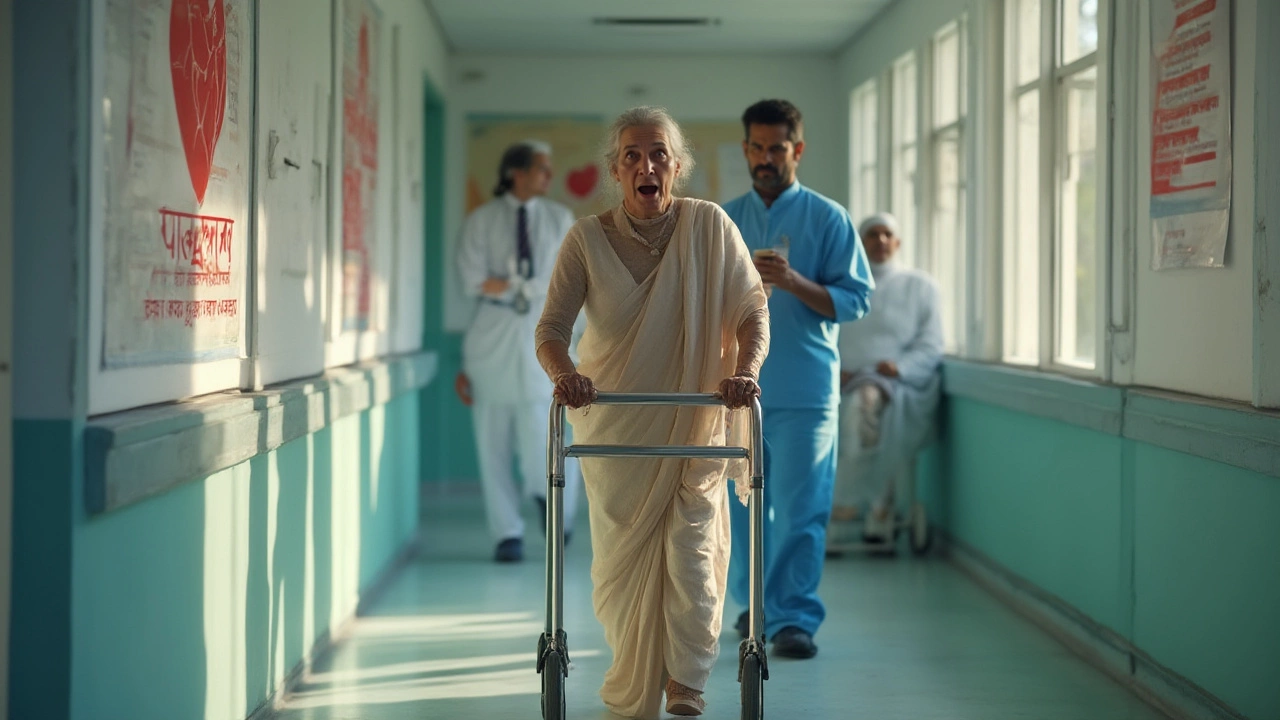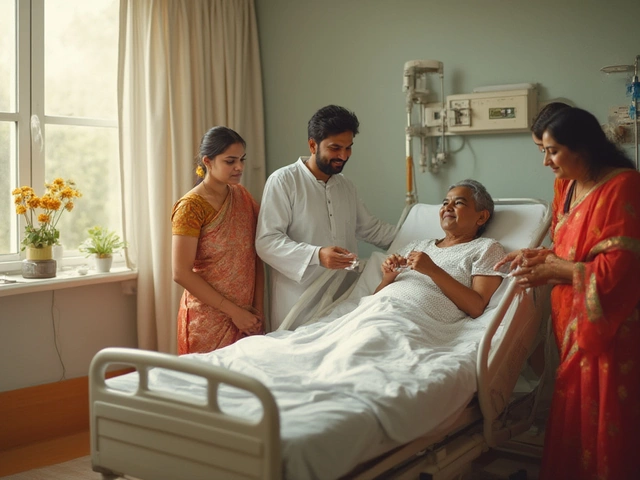Cracking open the chest to repair a heart isn’t something anybody signs up for on a whim, but over a million people each year face open-heart surgery in hospitals worldwide. Picture this: you’re lying in a hospital bed, counting ceiling tiles, wondering, "When do I finally get to see my own bed again?" The truth is, your time in the hospital after this major operation depends on a jigsaw of factors—not just the surgery itself. Let’s get right into the details, from expected timelines to surprising things nobody tells you about those first days and weeks after your chest is zipped back up.
The Typical Hospital Stay After Open-Heart Surgery
Right after open-heart surgery, nobody gets up and walks straight out the door. Most folks spend the first 24 to 48 hours in an intensive care unit (ICU). Here’s why: after major surgery, especially one involving your heart, you need constant monitoring for things like blood pressure, oxygen, infection, and heart rhythm changes. Instead of being hooked up to a simple heart monitor, you’re likely surrounded by a small tidy forest of tubes, wires, and blipping screens. Nurses pop in all hours.
On average, patients stay in the hospital for about 5 to 7 days total following open-heart surgery—some bounce out at 4 days, others linger up to 10 days or more. Think of this as a ballpark for people without complications. Why the range? If you’re younger, relatively healthy, and had a straightforward procedure like a single bypass, you might be up and home in under a week. But older people, those with diabetes, smokers, or someone who’s had complications during surgery could stick around for longer while things stabilize.
Now, let me throw a real-world detail your way: “Morning after” pain is no joke. Some people say it feels like you were run over by a small car, not just laid down on a comfy mattress. Pain control is a big part of this first phase because every cough or movement can sting as your breastbone heals. Most surgeries use a technique called a median sternotomy—basically, splitting the breastbone in half—which needs careful protection after.
According to data from the American Heart Association, around 85% of coronary artery bypass graft (CABG) patients are discharged in less than nine days. If you opt for minimally invasive approaches (where possible), the typical stay can shrink by one to two days compared to the old-school "open it all up" method.
| Type of Surgery | Avg. Hospital Stay (days) | ICU Stay (days) |
|---|---|---|
| Traditional CABG | 6-7 | 1-2 |
| Minimally Invasive Valve Repair | 3-5 | 1 |
| Multiple Valve/Bypass Procedures | 7-10 | 2+ |
Recovery rules are stricter than you’d think. Getting out of bed on day two or three isn’t optional—it’s actually mandatory. The team will practically drag you down the hall to kickstart your circulation and prevent blood clots and pneumonia. If you picture yourself lazing around endlessly, think again. It’s more like a boot camp for your insides.
One study from the Cleveland Clinic says, "Early mobility after surgery greatly reduces hospital stay and improves outcomes in open-heart patients." So when they wheel you out for walking exercises, fake enthusiasm and cooperate—it does help you get out faster.

Complications and Factors That Affect Length of Stay
If you’re rooting for the short-stay team, you want a surgery with zero complications. But life isn’t that tidy. Here’s a quick rundown of what can keep you longer in the hospital after open-heart surgery:
- Infection: Any infection, especially at the incision or in the chest, means you’re not going anywhere fast. High fevers and wound issues force doctors to keep you in while they throw antibiotics at the problem.
- Arrhythmias: About 20-40% of patients end up with irregular heartbeat issues (like atrial fibrillation) after surgery, especially older adults. Fixing this can mean extra monitoring and even more medications before discharge.
- Bleeding: Occasionally, people need to go back to the OR to stop a bleed. Blood tests and drain checks keep docs on top of this.
- Respiratory Complications: Fluid or infection in lungs calls for extra oxygen and extended stays.
- Kidney Trouble: Kidneys can act up post-op, especially in older or diabetic patients, which sometimes calls for dialysis.
As you might guess, your pre-surgery strength matters too. Smokers, anyone with weak lung function, people who are seriously overweight, and folks with multiple health problems almost always need more recovery time. Want to shave off hospital days? Cut back on smoking, eat healthier, and build some stamina in the weeks before surgery if you have a choice. Even small improvements help.
Medication adjustments can also slow things. Doctors have to experiment with blood thinners, heart medications, and blood pressure drugs to find your new balanced dose. Again, if you were already on a bunch of meds before surgery, this juggling act can take longer. Some lucky people with simple procedures—like a single bypass or valve that only needs a repair, not a replacement—might skip a few pitfalls and roll home ahead of schedule.
Your mental health can also play a role. It’s amazing how connected the brain and body are. Some people get waves of confusion, anxiety, or even mild delusions post-op, especially older adults. This so-called "ICU delirium" is more common than people realize, and it sometimes delays the big hospital goodbye. A friend’s grandfather didn’t even remember where he was for a couple days after surgery—totally normal, yet pretty wild to see.
Hospital routines run on protocol: you need stable vital signs, no infections or bleeding, and you have to prove you can breathe, eat, and walk a certain distance on your own. If you clear those hurdles—plus your home setup is ready and you have family to help—you’ll be introduced to the magical world of post-discharge instructions covering everything from wound care to driving bans.
“On average, patients are ready to leave the hospital within one week, but quality of recovery matters more than speed. Rushing home can lead to setbacks,” says Dr. Siddharth Mahajan, Cardiac Surgeon at Fortis Escorts Heart Institute.

Tangible Tips and What to Expect Once You’re Home
It’s tempting to think the hospital marks the finish line, but in reality, it’s only halftime. The real test is what happens when the hand-holding ends. The first thing you’ll notice once you leave the hospital is just how tired you feel, all the time. Simple things like getting dressed can wipe you out. Don’t panic—lots of people find themselves napping more in two weeks at home than they ever did before surgery. It’s normal. That’s your heart and body rebuilding reserves.
Nurses will probably stress wound care instructions so many times it feels like singing the national anthem: keep the chest incision clean and dry, watch for redness, swelling, or funky smells. A little clear or pink drainage is OK, but yellow or pus means call for help. Dressings change daily, especially if you sweat or get wet.
Don’t expect to run marathons. Walking is the main event. Most surgeons recommend strolling indoors for 5-10 minutes at a time, several times a day, at first. You’ll level up slowly—think video game XP style. Remember, climbing stairs is OK if you go slow and have help nearby. Avoid lifting anything heavier than a shopping bag to avoid popping your healing breastbone.
If you want to speed things up (in a healthy way), eat plenty of lean protein, fruits, and vegetables. Hydrate like you mean it—this helps flush out anesthesia and meds. Many people also sign up for a cardiac rehab program, which is sort of like having a gym coach, dietitian, and motivator rolled into one.
Most people can drive after 4-6 weeks, provided they’re off strong pain medication and the sternum is healing. As for intimacy? Give it 4-6 weeks—yes, that’s real advice given by doctors.
- Keep a diary or log your walks. Small wins feel big after major surgery.
- If you feel sudden chest pain, shortness of breath, or dizziness, don’t "wait and see." Call your doctor or get emergency help.
- Don’t ignore mood swings, sadness, or anxiety—they’re common and treatable after heart surgery.
- Plan your home for easy recovery—a chair with arms, slip-free floors, and everything within reach.
People always want the magic number: “When will I feel normal again?” For most open-heart surgery survivors, it takes six to eight weeks to get back to most routine activities. If you’re lucky and heal fast, you might feel pretty close to normal at six weeks. If things drag, it could take three months or longer. The heart is stubborn—and so are you, I bet, so don’t cut corners on recovery.
The bottom line? Hospital stay after open-heart surgery usually runs 5-7 days if all goes smooth, with ICU for a couple days. Complications, age, and your health history can stretch it out. Be patient, follow instructions, and keep your eyes on the bigger win—getting back to your normal life, heart stronger than before. Stay curious and ask questions at every step—there’s no such thing as a dumb question when you’re rebuilding from the inside out.







